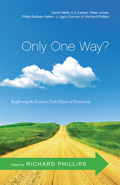
Richard D. Phillips
Reviewed by: William M. Hobbs
Only One Way? edited by Richard D. Phillips. Published by Crossway Books, 2006. Paperback, 151 pages, list price $12.99. Reviewed by OP pastor William M. Hobbs.
This book is a digest of the lectures given at the 2005 Philadelphia Conference on Reformed Theology. The six contributors are David Wells, Peter Jones, D.A. Carson, Philip Ryken, Ligon Duncan, and Richard Phillips. The title comes from John 14:6, and each speaker works from a text in the Scriptures dealing with particularity or exclusivity in Christianity. Christianity contrasts with the postmodernism of the Western world, which is increasingly unwilling to accept either revelation or reason. The whole notion of truth is constantly questioned today.
The introduction is provided by David Wells ("One Among Many"), working from Paul's speech at Athens recorded in Acts 17. The connections Wells suggests between Paul's world and ours are quite compelling. In a world that is urban and idolatrous just like ours, Paul did not seek acceptance or success; he simply told the truth.
Peter Jones deals with "One God." I found this the most amazing and troubling of the talks because I am plainly unexposed to much of the nonsense that is passing for ideas about God these days. Working loosely from Genesis 1:1, Jones presents the Creator, sovereign, eternal, holy, etc. Richard Phillips works from Romans 3:23-25 ("One Savior"). He sets out to correctly define the problem. The key problem in most aberrant theology, at its core, is its view of man. Modern man is fascinated with himself without reason.
Philip Ryken ("One Truth") works from John 18:37-38. The postmodern approach to truth is quite brazen. There is no propositional truth, we are often told. This thinking has reached the conservative Reformed world, too. This is clearly stated by Ryken and quite nicely tied in with living a life of truth in love (Eph. 4:15).
Ligon Duncan deals with "One People" from 1 Peter 2:9-10. He presents a careful exegetical study of God's people as those of God's own choice, for his service, as he is in true holiness, and for his possession. He closes with Spurgeon's searching question: in light of the cross, does God love us more than he loves his own Son? So, is God delighting in us now?
D. A. Carson concludes the book with "One Way," working from Matthew 7:13. He looks at the four contrasts that finish the Sermon on the Mount: two ways, two trees, two claims, and two foundations. Despite the postmodern claim that everything is vague, Jesus sees it all as a choice between the way of the kingdom and the way of death. Carson ever brings us back to our Savior and his work. When "sin has gone over us," we remember that no one comes to the Father but by the Son.
This book seeks to return us to Christ as the way, the truth, and the life. It helps us to understand what is going on in the world around us.
June 15, 2025
June 08, 2025
June 01, 2025
Anxiety: Finding the Better Story
May 25, 2025
April 27, 2025
The Devoted Mind: Seeking God’s Face in a World of Distraction
April 20, 2025
April 13, 2025
© 2025 The Orthodox Presbyterian Church